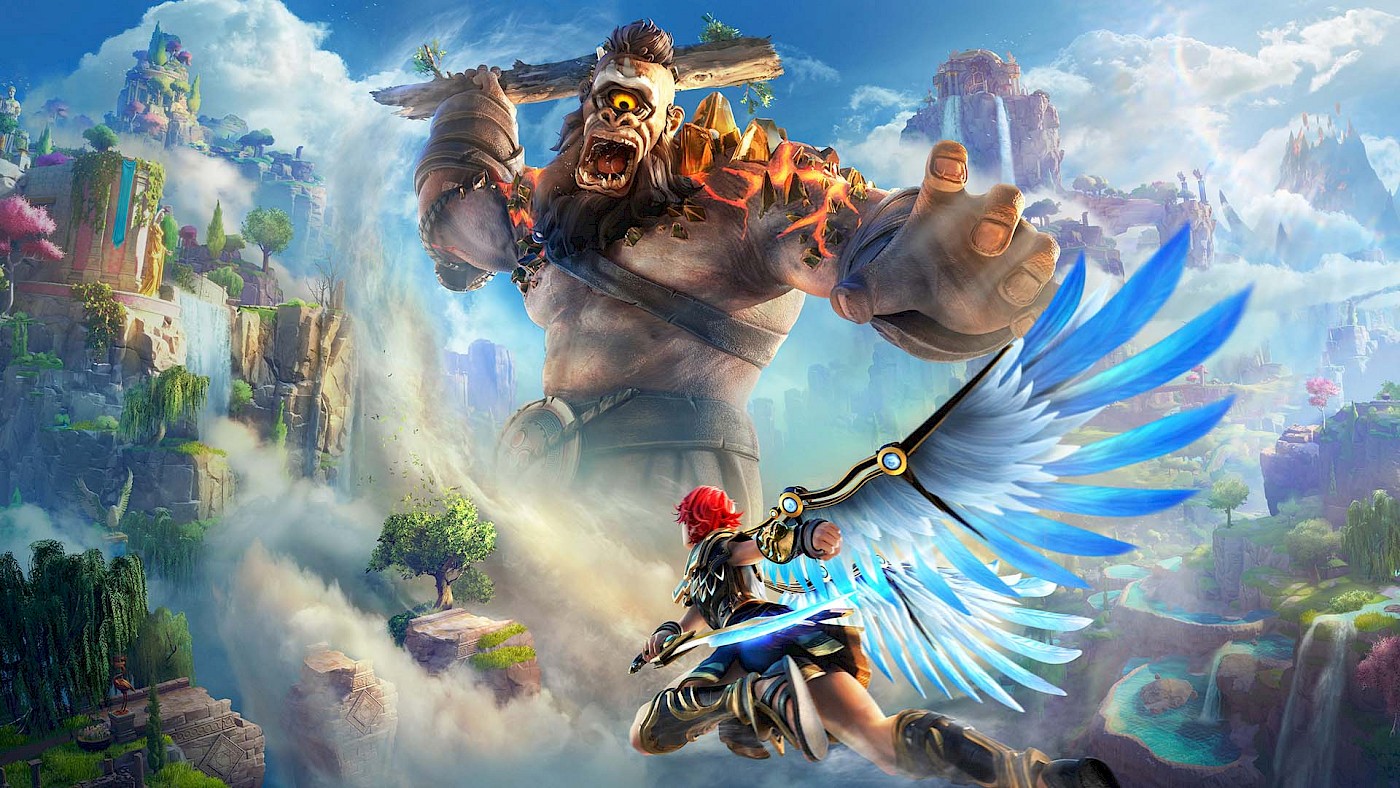What felt like a short time after the release of Assassin’s Creed: Odyssey (2018), publisher Ubisoft announced a new game, Gods & Monsters, which would take Odyssey and merge it with the more stylized and colourful art style, as well as some of the gameplay elements, of Nintendo’s Zelda: Breath of the Wild.
The main pull of Assassin’s Creed: Odyssey was its historical setting: the Peloponnesian War of 431-404 BC that pitted Athens against Sparta. It was a monumental game to which I have devoted a series of articles; I also talked about it for the national radio here in the Netherlands and in videos for Invicta History, and gave a few short lectures about it at the National Museum of Antiquities in Leiden.
How did Odyssey depict Classical Greece? This was an interesting subject to explore. The game drew heavy inspiration from pop culture, especially the movie 300. The developers got a lot of things right with regards to the setting, including material culture, but also made a few “mistakes”. Importantly, though, it did feel “authentic” – even though that is largely a subjective measure when it comes to historical fiction.
But Odyssey was still an Assassin’s Creed game, which meant that it came with baggage that I didn’t care much for. There are ancient conspiracies and struggles between Assassins and Templars that recall the kind of stuff that Dan Brown churns out. The advanced, alien Isu that somehow feature in the mess that is Assassin’s Creed overall plot always struck me as inspired by Erich von Däniken’s risible Chariots of the Gods (1968).
Fortunately, Immortals: Fenyx Rising (2020) is a brand new game, unshackled from Assassin’s Creed’s legacy. Odyssey frequently referenced ancient Greek mythology, with the developers even arranging for the player character to fight a number of monsters, such as the Minotaur, hidden away in the bowels of the palace at Knossos. Immortals abandons any pretext regarding historical accuracy and fully embraces mythology – and it’s arguably a better game for it.
The Golden Isle
The plot for Immortals: Fenyx Rising is simple. The player character, who can be male or female and is always named Fenyx (a decidely weird way to render the Greek Phoinix), is a shield bearer. They were on the way back from war when their ship was destroyed in a storm. Fenyx wakes up on an unknown beach and discovers that all of their crewmates, including their brother, have been turned to stone.
It turns out that Fenyx has arrived on the Golden Isle. It is probably based on the Golden Isles, White Island, or Isles of the Blessed. There, in Greek mythology, some ancient heroes live after death, such as Menelaus (by virtue of having married Helen, the daughter of Zeus). In the game, the Golden Isle also features the homes of some of the Olympian gods, most notably Aphrodite, Hephaestus, Ares, and Athena. There is also the Hall of the Gods, which serves as the base of operations for Fenyx’s adventures.
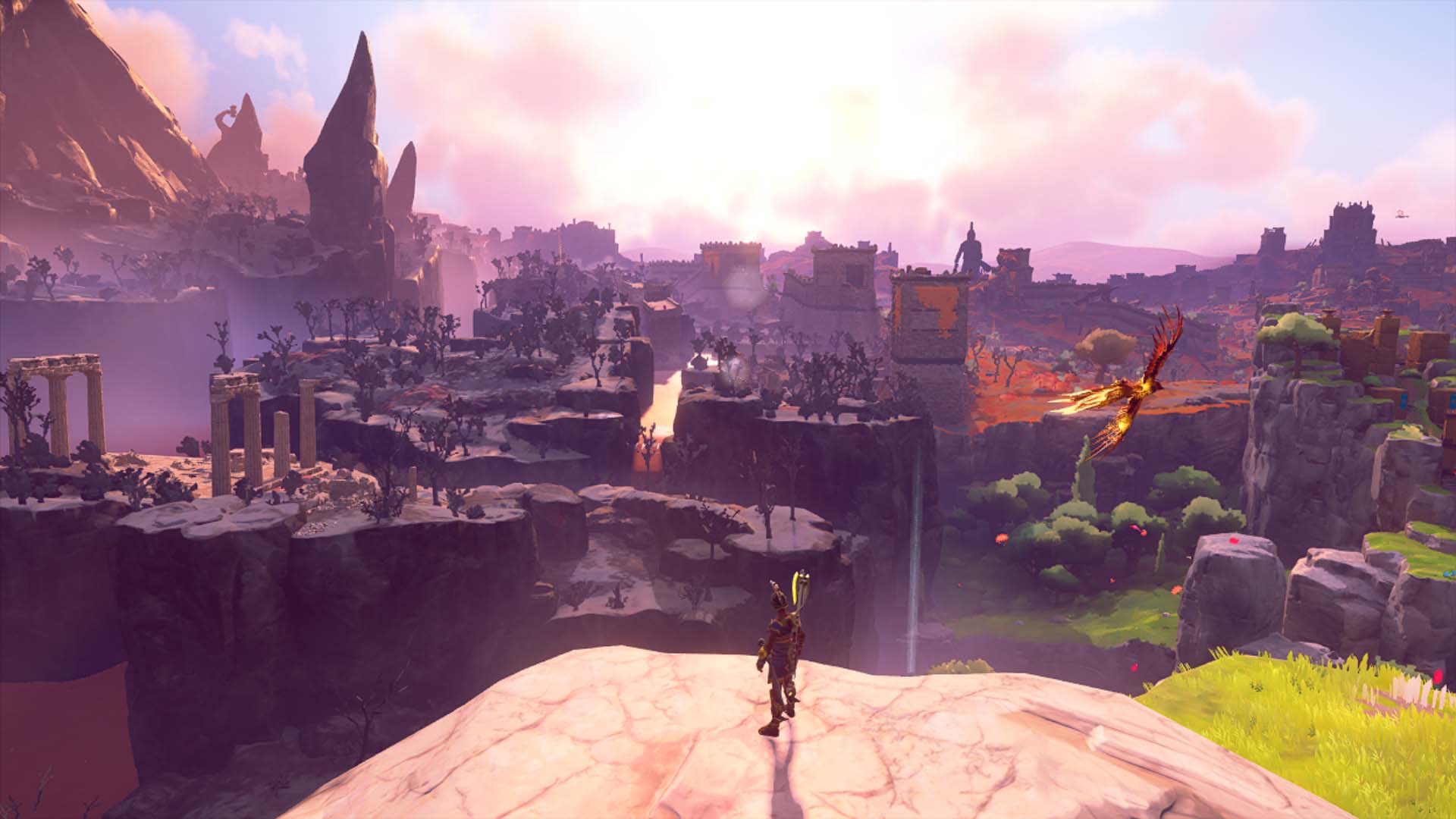
In the centre of the map is a large volcano that is the home of the monstrous Typhon. The latter escaped its underworld prison and now wages war against the gods. Some of the gods have fled. Others were stripped of their powers. I won’t spoil the game by saying what these deities were turned into (especially Ares made me laugh!), but restoring them to their former glory provides the thrust behind much of what you do in the game. Even Zeus has suffered from Typhon’s wrath: he is no longer able to conjure his lightning bolts.
As the gods proved unable to withstand Typhon, it now falls on a mortal – i.e. you, as Fenyx – to restore the gods to their former glory and to wage a battle against Typhon. In order to do so, you will have to explore the Golden Isle, gather resources to upgrade your character and their equipment (there are no experience points!), fight monsters and wild animals, look for chests (some of which are guarded and some of which are only accessible at night), explore “vaults of Hades” (Zelda-like dungeons that feature puzzles and sometimes also battles), resolve quests, and so on.
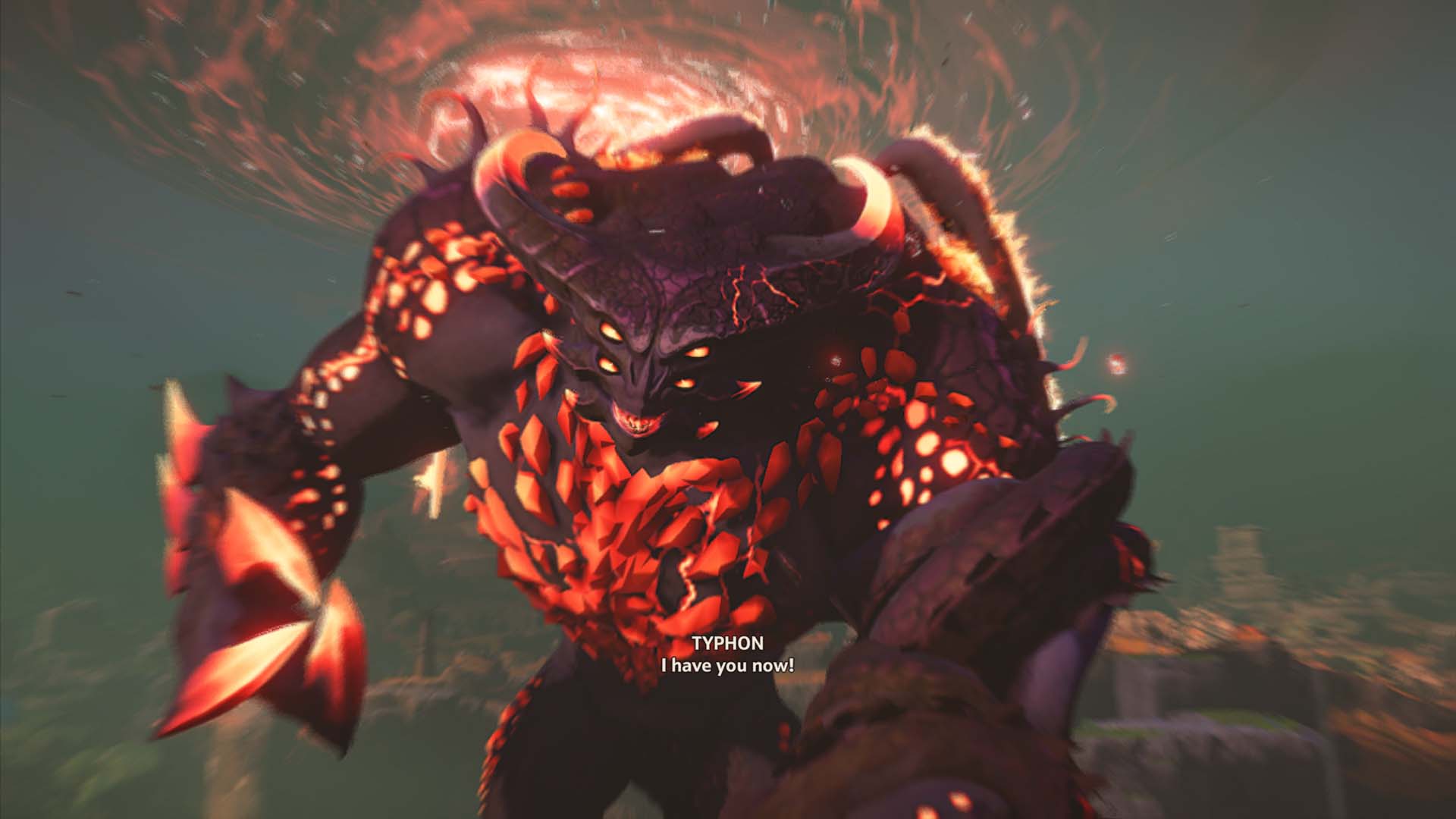
I appreciate that the developers went with Typhon as the main enemy. As recorded by, for example, the poet Hesiod, the monstrous Typhon posed a serious challenge early in Zeus’ reign. It would have been easy for Ubisoft to do something silly like casting Hades as the villain – but this team knows their Greek mythology, and they revel in retelling the ancient tales.
The game itself is framed as a story told to Zeus by Prometheus. Prometheus is shackled to a rock and is visited each day by an eagle (Zeus’ sacred animal), who picks out his liver – which promptly regrows each night. This was Zeus’ punishment for Prometheus’ transgressions against the gods, such as stealing fire from Olympus to give to the mortals.

Assassin’s Creed: Odyssey uses humour to add some levity to the proceedings, but it was, all in all, a serious game. Immortals: Fenyx Rising embraces comedy to the fullest: as Prometheus tells the story of Fenyx as you play, Zeus frequently interjects funny comments or pointed asides. Even the game tips that are shown during the loading screens have light-hearted comments from Zeus (signed simply “Z”). It’s genuinely funny, and it’s easily the best written game I’ve played in a long time. It also helps that the voice acting is consistently great.
The comedic framing of the game and the colourful visuals might suggest that this is a game aimed at a younger audience. It is better suited, I would guess, for younger teenagers than Odyssey – though parents should be aware that the dialogue sometimes gets a bit bawdy (thanks, Zeus!), and there are references to e.g. prostitutes (thanks again, Zeus!). It’s a perfectly enjoyable game for adult players, too.
A different kind of odyssey
Immortals: Fenyx Rising is a game made by the same team as Assassin’s Creed: Odyssey and I’ve referenced the 2018 game numerous times by now. This might suggest that Immortals is little more than a reskin of the earlier game. This was what I sort of expected and the reason why I didn’t bother to check out the game before it came on sale this winter.
But I am happy to report that while there obviously are similarities, Immortals is very much its own game. Yes, like Odyssey, this is set in an open world (as many Ubisoft games are!), the controls are similar to Odyssey, the combat is similar and, indeed, you can also sneak around, hide in bushes, and engage in stealth attacks from behind.

The devil is in the details, however. The game’s world is not as sprawling as in Odyssey: this is a carefully-designed space, more like a theme park than any real place. Each region feels different, with its own features and easily recognizable landmarks. Ít still feels like a large space to explore, but there is always something to do. There is never a dull moment when traversing the island.
And speaking of traversal, this too is handled differently than in Odyssey. You can climb almost every surface in the game; except the walls in the dungeons, the “vaults of Hades”, for some reason. The developers have borrowed the stamina mechanic from Zelda: Breath of the Wild: climbing decreases your stamina and if it runs out, Fenyx falls from the surface they were climbing. Unless you take care to climb from ledge to ledge, this usually ends in a game over screen. Stamina is also consumed while swimming, but if it runs out, you’ll be teleported to shore and lose only one health chunk.

Early in the game, you will come across the wings made by Daedalus, the Athenian inventor. These are initially incomplete, so that they only allow you to double jump. But a little later, you find the missing parts. You can then leap off tall places and float with them. Holding down the right button allows you to accelarate your speed or to dive bomb down to the surface. Again, floating consumes stamina and if you run out, Fenyx falls from the air like a stone.
As in Odyssey, you can outfit your player character with an array of weapons and armour, but the options are slightly more limited: a sword for a primary weapon, an axe for a secondary weapon, helmets, suits of armour (no longer individual greaves, corslets, and so on), as well as different types of bows. Personally, I like that Immortals offers a more focused experience than Odyssey, but some might lament the lack of options – even though there are still plenty of ways to customize Fenyx.

And while the combat is similar to Odyssey, movements are more exaggerated, and you’re able to jump higher, engage in aerial attacks, and so on. Weapons also deal “stun” in addition to damage: if the blue bar underneath their red health bar fills up, they end up immobilized for a short time. Enemies respond to getting hit in a more aggerated style, and they telegraph their attacks more clearly. Enemies are also more varied: you’ll fight animals, human-like opponents, and a varied array of monsters, including gorgons, minotaurs, harpies, and cyclopes.
The game’s stamina system also comes into play during the combat. Using special abilities will consume stamina, as does shooting arrows and performing double jumps. This means that you will need to manage your stamina carefully, especially in the beginning. Arrows are limited in number, but “regenerate” at a constant rate, so you never have to worry about e.g. crafting new arrows or collecting fresh arrows from somewhere. Dodging doesn’t consume stamina: you’ll do that a lot alongside parrying attacks (some attacks cannot be blocked).
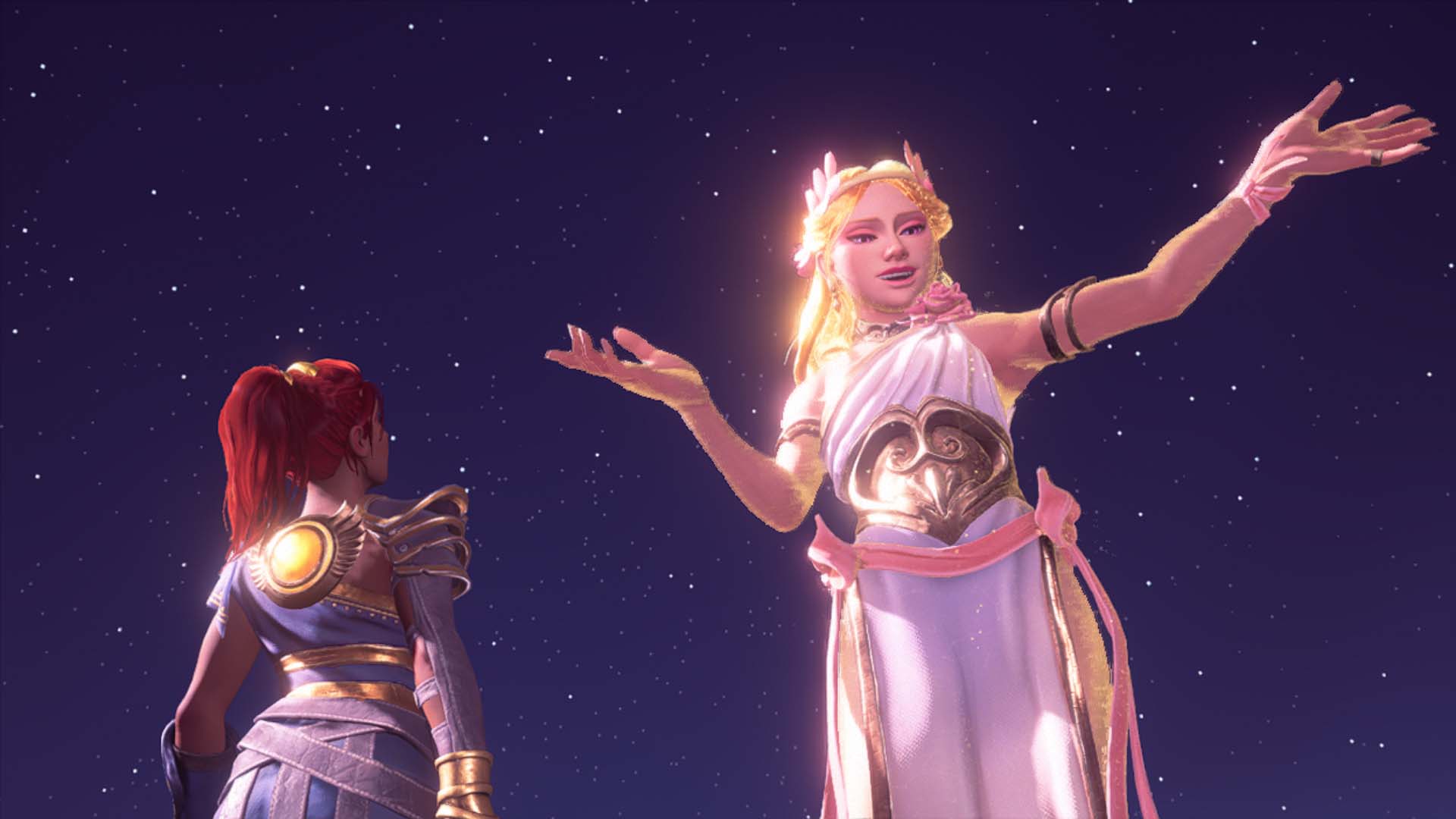
You are also able to tame a variety of non-aggressive animals to use as mounts. You are also accompanied by a phoenix – the bird that rises from its own ashes – and it functions not entirely the same as the eagle in Odyssey. I am not entirely convinced as to the utility of the bird in the game, but perhaps this has yet to be revealed to me. You cannot use it to “tag” enemies like you can do with the eagle in Odyssey.
One of the aspects I enjoyed the most about Immortals is how it is not just an action game, but also very much a puzzle game. The landscape is dotted with minor puzzles. Most of these are fairly simple. In one case, I had to unlock a door by attacking a stone block to reveal the statue inside: Michelangelo would have appreciated that one.
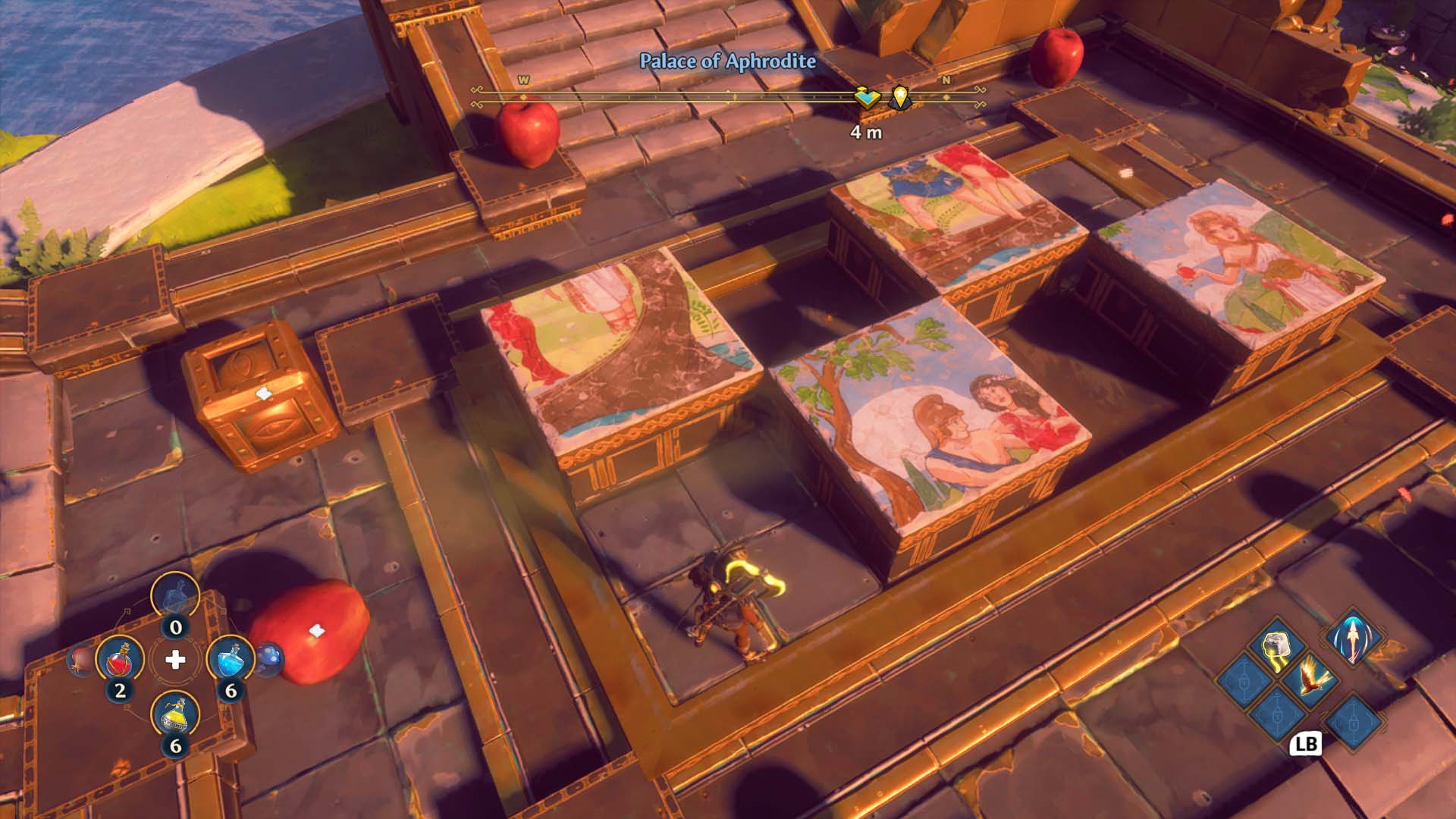
In another, I had to solve a sliding puzzle (“Fresco Challenge”) that featured four pieces. You also often need to light braziers by shooting a flaming arrow into them to open a door or activate something; this becomes tricky when you need to use “Apollo’s Arrow”, which you can control after shooting so you can control the flight of it yourself. One very fun type of challenge you can come across requires you to shoot the arrow through the rings on the handles of a series of double axes.
More involved puzzles can be found in the “vaults of Hades”, which are analogous to the dungeons from the Zelda games. These vaults are accessed through gaping red holes found in the landscape. The architecture inside the vaults consists of floating structures, offering some platforming challenges since you are not able to climb any surfaces here: a misjudged jump can result in Fenyx being returned to the nearest checkpoint (which are plentiful).
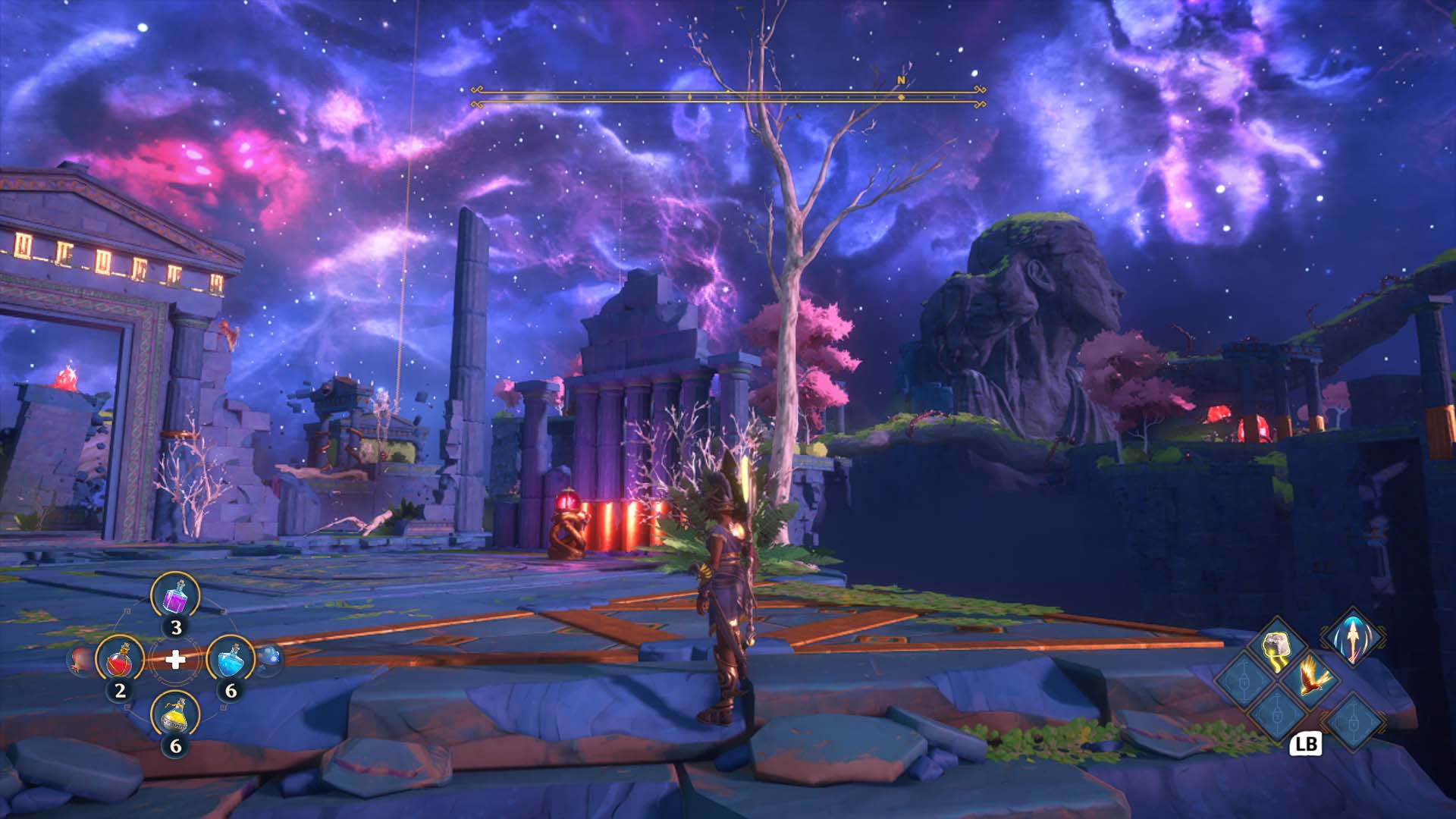
The goal in each vault is the same: reach the end, where you can grab a piece of Zeus’ lightning bolt (used to upgrade your character). Vaults sometimes contain chests; in a few instances, they also contain quest objects that you need to obtain. A vault remains accessible as long as you haven’t collected everything from it; once done, it is sealed forever.
The vault puzzles again tend to be simple, but never tedious. More than a few vaults feature very elaborate levels that will have you figure out exactly how to trigger something to be able to push a boulder or ball inside a socket to activate something else. You will be pulling levers, pushing boulders, balls, and blocks, as well as jump and float around.

Back in the overworld, Typhon will periodically be roused: in these cases, the sky turns dark, the volcano that he resides in spews forth flaming rocks, lightning strikes the earth, and various monsters appear, including wraiths that will try to hunt you down. At the start of the game, I was pursued by the wraith of Achilles, whose look and combat style was clearly modelled after Brad Pitt’s Achilles in Wolfgang Petersen’s 2004-movie Troy.
Both Zeus and Prometheus generally provide a witty running commentary that is almost always funny. And whenever you return to the Hall of the Gods, Hermes usually has a quip or two, as well. However, he’s mostly concerned with selling you some of the in-game cosmetics – like Odyssey, Immortals has an in-game store where you can buy stuff using a premium currency. As in Odyssey, it’s easy to ignore, and the premium currency can also be earned by completing time-sensitive challenges.
Closing thoughts
Immortals: Fenyx Rising is a very accomplished open world game that offers plenty of action as well as a large amount of entertaining puzzles. The game’s main pillars are exploration, engaging in combat, and solving puzzles. The three are often mixed together in a satisfying way, too. It really is a great game.
Players who are afraid that the game is perhaps too casual need not worry. I started out on normal, which is two steps up from “story” and “easy” difficulty. Normal initially felt a bit too easy, but the difficulty ramped up quite quickly, to the point where upgrading abilities and gear was an absolute must to progress. Of course, you can lower or raise the difficulty at any point.
Much to my own pleasant surprise, Immortals looks, plays, and feels very different from Assassin’s Creed: Odyssey – the similarities are there, but Immortals is very much its own game. I also don’t think the game recycles any of Odyssey’s assets, with the possible exception of some statues; the art style is simply too different.
The developers also take a deep dive into Greek mythology, with Prometheus and Zeus offering takes on the ancient Greek stories that are very much in line with the sources that have survived to the present day. If you’re into Greek mythology, this game is sure to strike a chord. There is a lot of good stuff in here.
The art style and humour, as well as the solid gameplay, mean that Immortals is a well-rounded, entertaining package that should appeal to a wider range of gamers than the more serious Assassin’s Creed: Odyssey. If you have any interest in Greek mythology and what modern games can do with the subject matter, you should definitely check it out.
I thoroughly recommend Immortals: Fenyx Rising. Simply put: it’s one of the best games I have ever played.
